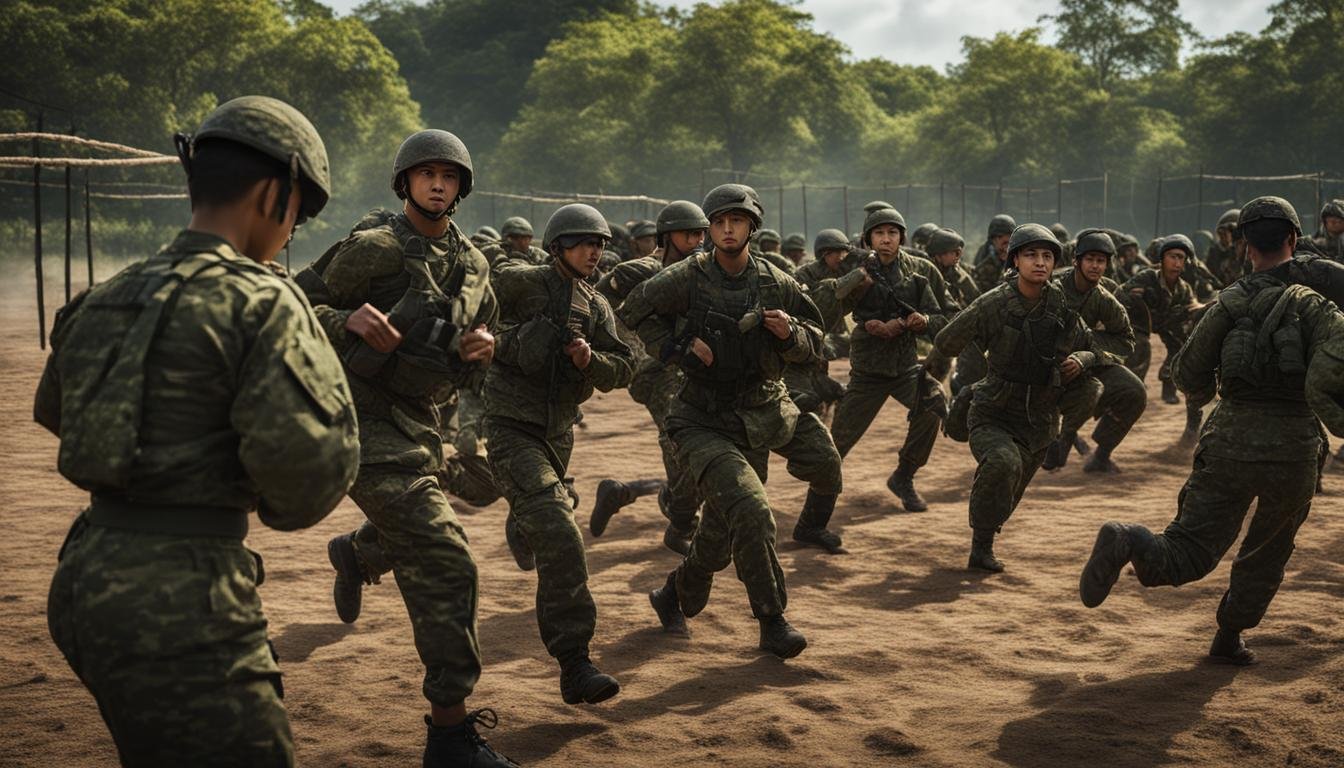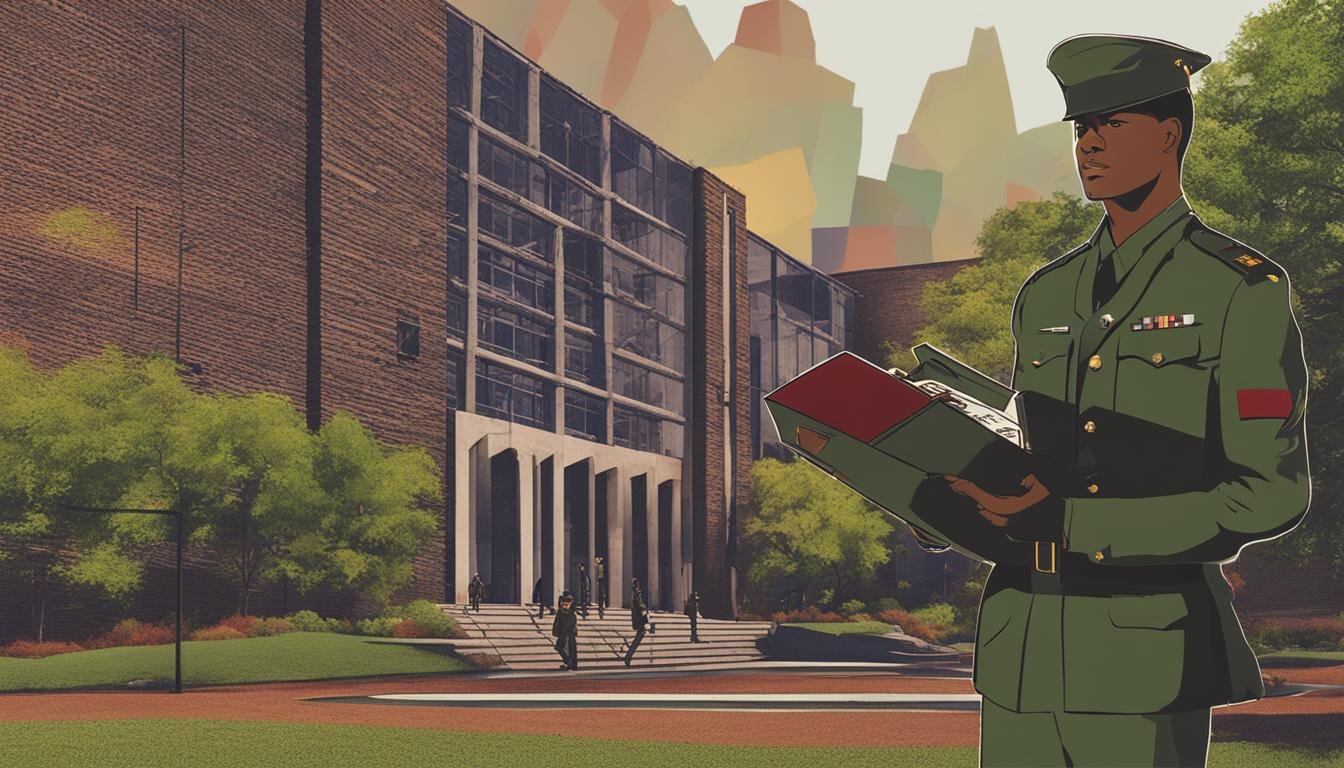Are you a military service member considering pursuing a college degree? You may be wondering how your military training relates to obtaining a college education. Well, you’ll be glad to know that military training offers numerous benefits and transferable skills that can give you a significant career advantage in both military and civilian fields.
Throughout your military service, you have undergone specialized job training that is comparable to civilian professions. This training equips you with valuable skills and knowledge that can be directly applicable to college degree programs. Additionally, there are various programs and opportunities available to help active-duty service members earn higher education degrees while still serving.
Key Takeaways:
- Military training provides transferable skills and a career advantage.
- Active-duty service members can pursue college degrees through programs like the Military Tuition Assistance Program and ROTC.
- After leaving the military, veterans have access to educational opportunities through the Post-9/11 GI Bill and other programs.
- Choosing a veteran-friendly university and aligning your major with your military occupational specialties can enhance the transferability of your military experience.
- Enrolling in college can lead to future opportunities for career advancement, higher earning potential, and personal growth.
Job Training and Education during Military Service

During your military service, you will not only gain valuable skills and experience for your military career but also have opportunities for job training and education that can benefit you in your civilian life. Here are some key aspects of job training and education in the military:
Military Occupational Specialty (MOS)
In the military, you will receive extensive training specific to your assigned job, known as your Military Occupational Specialty (MOS). This training equips you with the necessary knowledge and skills to excel in your role. Importantly, many of these skills are directly transferable to civilian careers, providing you with a competitive edge in the job market. For example, if you serve as an Air Force combat controller, you may obtain FAA certifications that can be valuable in pursuing a career as an air traffic controller in the civilian sector.
College Degrees
The military offers various programs to support active-duty service members in pursuing college degrees. One such program is the Military Tuition Assistance Program, which provides financial assistance for tuition expenses. Through this program, you can attend college while serving and further your education without incurring significant debt. Additionally, the Reserve Officer Training Corps (ROTC) offers scholarships to eligible individuals, covering tuition, fees, and textbooks. By participating in ROTC, you can receive military officer training while simultaneously working towards your degree.
Loan Repayment Programs
A commitment to military service should not deter you from pursuing higher education due to student loans. Both the Army and the Navy offer loan repayment programs, which can help alleviate the financial burden of student debt. By enrolling in these programs, you can receive assistance in repaying your student loans, allowing you to focus on your education and future career.
Table: Military Education Programs
| Program | Description |
|---|---|
| Military Tuition Assistance Program | Financial support for active-duty service members to pursue college degrees |
| ROTC | Military officer training and scholarships for college tuition, fees, and textbooks |
| Loan Repayment Programs | Assistance in repaying student loans for Army and Navy service members |
By taking advantage of these job training and education opportunities during your military service, you can enhance your skills, broaden your knowledge, and increase your career prospects both within and outside the military.
Education and Career Opportunities after Military Service

After serving in the military, there are several education and career opportunities available to veterans. These opportunities can help veterans transition into civilian life, gain new skills, and enhance their career prospects. Let’s explore some of the key programs and resources that support veterans in their educational and professional journeys.
1. Post-9/11 GI Bill
The Post-9/11 GI Bill is a comprehensive educational benefit that provides financial support to veterans pursuing higher education. Through this program, veterans can have their tuition expenses fully covered and receive a monthly housing allowance. This benefit allows veterans to focus on their studies without the burden of financial stress, enabling them to maximize their educational opportunities.
2. Montgomery GI Bill
The Montgomery GI Bill is another valuable educational support program for veterans. It offers financial assistance for a variety of education and training programs, including college degrees, flight training, and apprenticeships. By utilizing this benefit, veterans can further expand their knowledge and skills in their desired fields, opening doors to new career possibilities.
3. Rogers STEM Scholarship
The Rogers STEM Scholarship is specifically designed for veterans and FRY Scholars pursuing degrees in science, technology, engineering, or mathematics (STEM) fields. This scholarship provides financial aid to support their educational journey in these high-demand disciplines. By receiving this scholarship, veterans can gain a competitive edge in the job market and contribute to breakthroughs in STEM industries.
4. Military OneSource
Military OneSource is a valuable resource that offers educational consultation services to service members and their families. They provide guidance on achieving education goals, finding military-friendly colleges and universities, and applying for scholarships. With the support of Military OneSource, veterans can navigate the complex educational landscape and make informed decisions about their future.
5. COOL Program
The COOL (Credentialing Opportunities OnLine) program is designed to help veterans translate their military experience into civilian credentials and certifications. It assists in aligning military occupations with civilian job requirements, making it easier for veterans to showcase their skills and qualifications in their resumes. This program provides a pathway to public service jobs and enhances veterans’ employability in various fields.
By leveraging these education and career opportunities, veterans can make a successful transition into civilian life and pave the way for a fulfilling and prosperous future.
Table: Education and Career Opportunities After Military Service
| Program | Description |
|---|---|
| Post-9/11 GI Bill | Comprehensive educational benefit that covers tuition expenses and provides a monthly housing allowance. |
| Montgomery GI Bill | Financial assistance for various education and training programs, including college degrees, flight training, and apprenticeships. |
| Rogers STEM Scholarship | Specifically for veterans pursuing STEM degrees, providing financial aid and opportunities in high-demand fields. |
| Military OneSource | Resource offering educational consultation services to service members and their families, assisting with education goals and scholarships. |
| COOL Program | Helps veterans translate military experience into civilian credentials, increasing employability in various industries. |
By taking advantage of these programs and resources, veterans can continue their education, gain valuable skills, and embark on successful career paths. The support available to veterans ensures that their military service is recognized and rewarded, providing them with opportunities to thrive in civilian life.
How Does Military Training Translate to College Degrees?
Military skill sets and academics are highly transferable to college degrees. The discipline, leadership, and critical thinking skills developed in the military can be applied to academic pursuits. Additionally, many colleges offer programs specifically designed to help veterans transition their military experience into valuable academic credentials.
Conclusion
Military personnel possess a wealth of skills and experience that are highly relevant to college degrees, providing them with a competitive edge in future careers. By taking advantage of various resources, service members can maximize their benefits and pave the way for exciting opportunities.
One way to capitalize on military training is to obtain college credit for the skills acquired during service. Utilizing resources like the Joint Services Transcript can help military personnel translate their experience into tangible college credits, reducing the time and cost required to earn a degree.
Additionally, the choice of university plays a crucial role in optimizing the benefits gained from military service. It is essential to select a veteran-friendly institution that recognizes and values the unique skills and qualities military personnel bring to the table. Aligning the major with military occupational specialties can further enhance the transferability of military experience in the civilian job market.
By enrolling in college, military personnel open up a world of future opportunities. Beyond career advancement and higher earning potential, pursuing higher education fosters personal growth and development. It equips individuals with the knowledge and skills necessary to thrive in a rapidly changing world, ensuring a bright and prosperous future.



